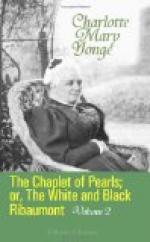Infants as the boy and girl were, the King had hurried on their marriage to secure its taking place in the lifetime of the Count. The Countess had died soon after the birth of the little girl, and if the arrangement were to take effect at all, it must be before she should fall under the guardianship of her uncle, the Chevalier. Therefore the King had caused her to be brought up from the cottage in Anjou, where she had been nursed, and in person superintended the brilliant wedding. He himself led off the dance with the tiny bride, conducting her through its mazes with fatherly kindliness and condescension; but Queen Catherine, who was strongly in the interests of the Angevin branch, and had always detested the Baron as her husband’s intimate, excused herself from dancing with the bridegroom. He therefore fell to the share of the Dauphiness Queen of Scots, a lovely, bright-eyed, laughing girl, who so completely fascinated the little fellow, that he convulsed the court by observing that he should not have objected to be married to some one like her, instead of a little baby like Eustacie.
Amid all the mirth, it was not only the Chevalier and the Queen who bore displeased looks. In truth, both were too great adepts in court life to let their dissatisfaction appear. The gloomiest face was that of him whose triumph it was—the bridegroom’s father, the Baron de Ribaumont. He had suffered severely from the sickness that prevailed in St. Quentin, when in the last August the Admiral de Coligny had been besieged there by the Spaniards, and all agreed that he had never been the same man since, either in health or in demeanour. When he came back from his captivity and found the King bent on crowning his return by the marriage of the children, he had hung back, spoken of scruples about such unconscious vows, and had finally only consented under stress of the personal friendship of the King, and on condition that he and his wife should at once have the sole custody of the little bride. Even then he moved about the gay scene with so distressed and morose an air that he was evidently either under the influence of a scruple of conscience or of a foreboding of evil.
No one doubted that it had been the latter, when, three days later, Henri II., in the prime of his strength and height of his spirits, encountered young Des Lorges in the lists, received the splinter of a lance in his eye, and died two days afterwards.
No sooner were his obsequies over than the Baron de Ribaumont set off with his wife and the little bridal pair for his castle of Leurre, in Normandy, nor was he ever seen at court again.
CHAPTER II. THE SEPARATION
Parted without the least regret,
Except that they had ever met.
* * * *
Misses, the tale that I relate,
This lesson seems to carry:
Choose not alone a proper mate,
But proper time to marry!
Cowper,
pairing time anticipated




